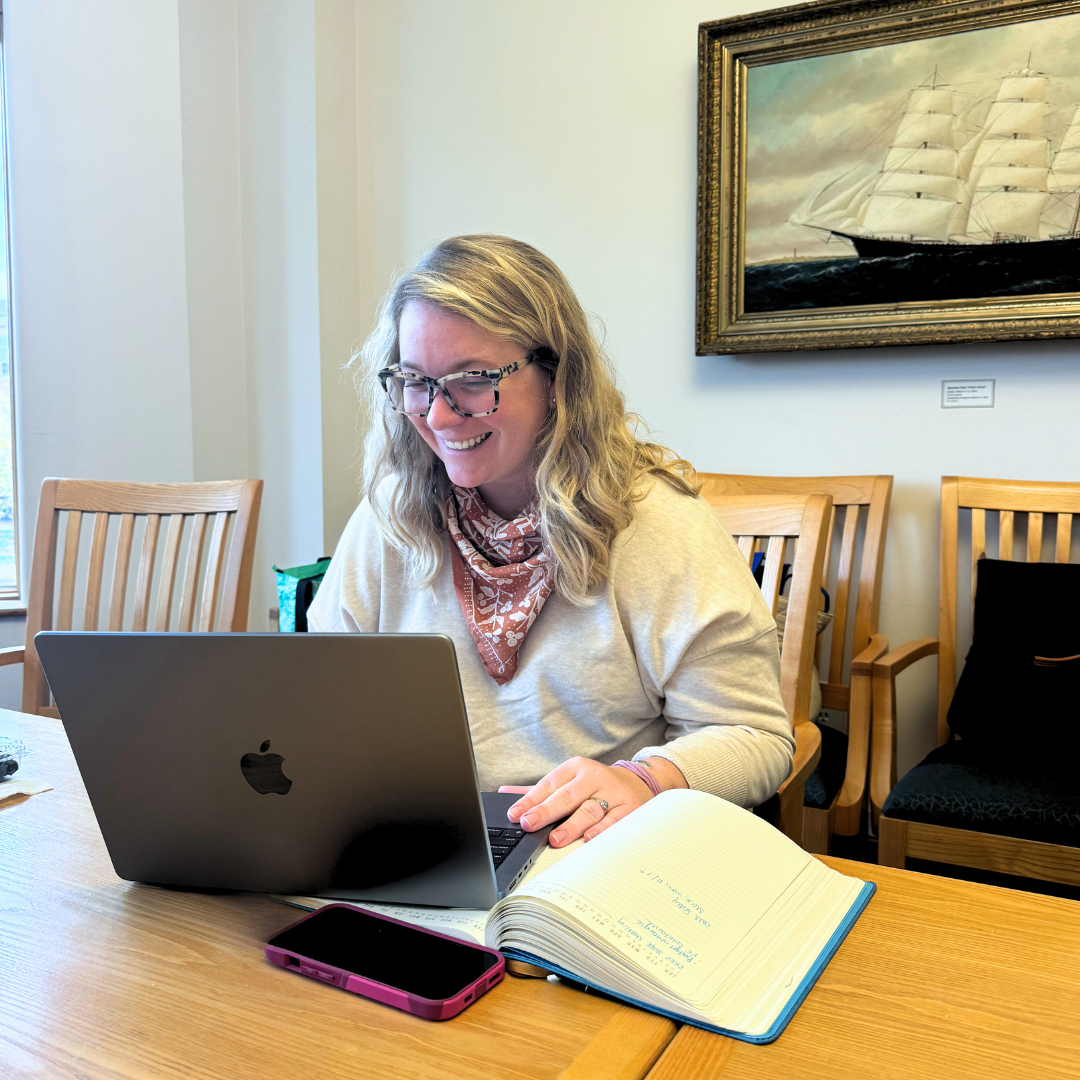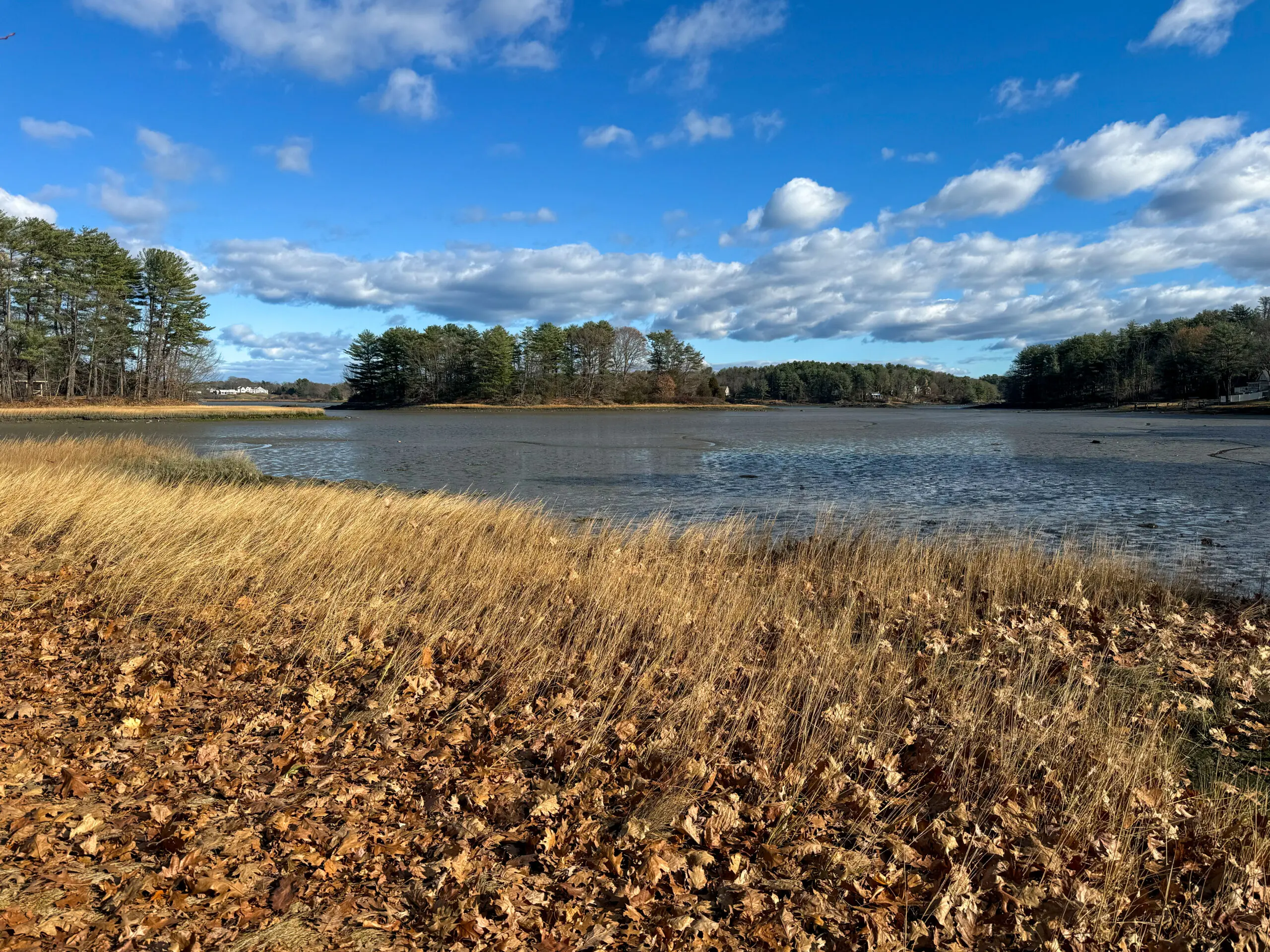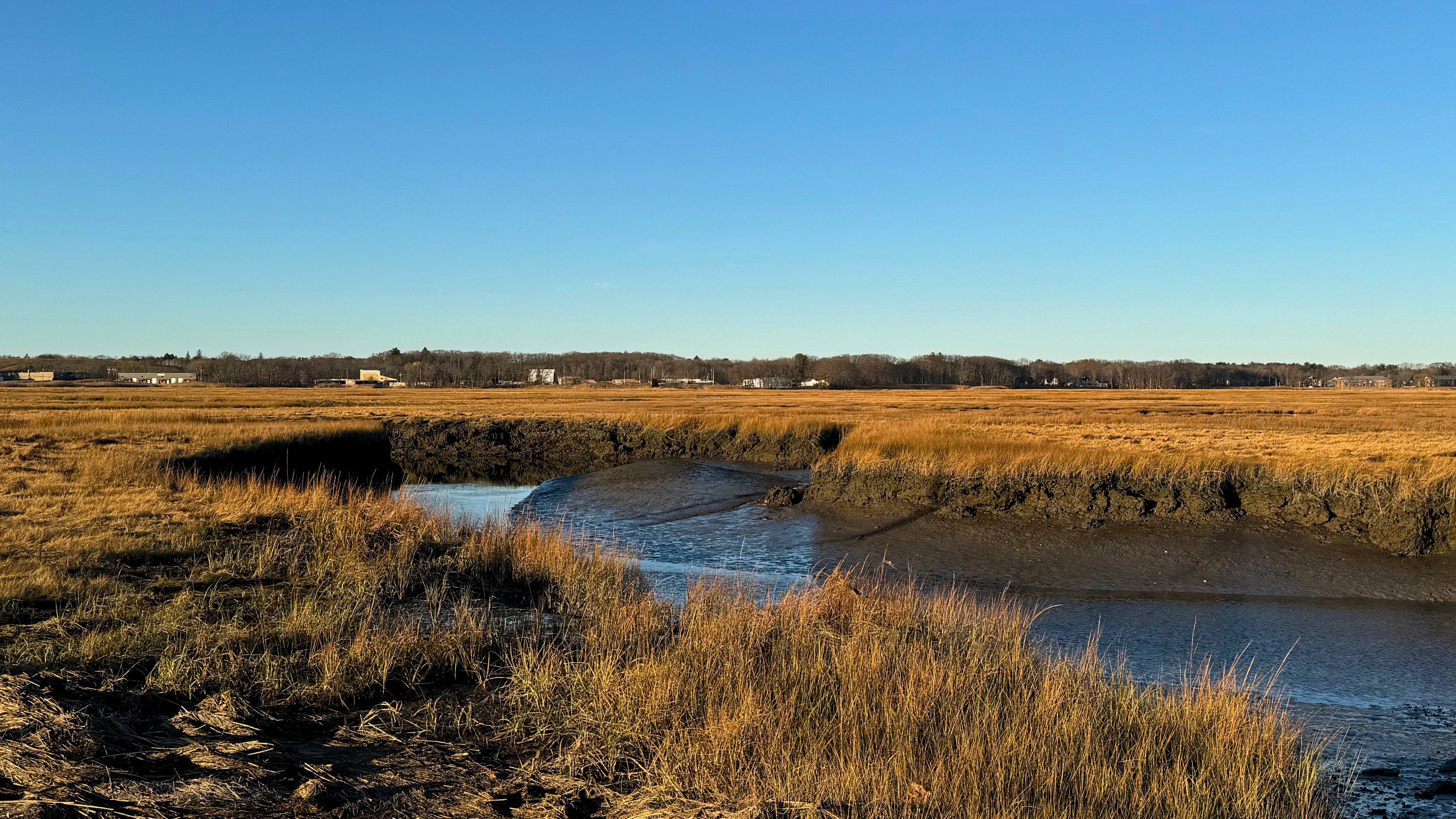Article first appeared at 7 Rivers to the Coast
A conversation between PREP's Amy Sauber and Abigail Lyon
Spring in New Hampshire and Maine begins with mud season—cold, rainy, and windy. Snowmelt swells the rivers, turning roads into slick channels and making it a prime time for runoff. Back in Spring of 2015, runoff season had taken on a new meaning. Abigail Lyon, my colleague at the Piscataqua Region Estuaries Partnership (PREP), sat at a table with a town grappling with the complex and unfamiliar world of MS4 (Municipal Separate Storm Sewer System) permits. MS4 permits are meant to protect waterways and people’s health by ensuring runoff from streets is treated for pollution—but for a town with limited resources, meeting permit requirements felt like an uphill battle.
The town had no paid staff, only volunteers juggling multiple roles. MS4 compliance wasn’t just about deciphering regulations; it was using the rules to enhance people’s livelihoods, their community’s quality of life, and the future of their rivers and estuaries. How could they meet the requirements with so few resources? Where could they even begin?
It was the perfect moment for the newly launched PREPA Grant Program (Piscataqua Region Environmental Planning Assessment Grant) to step in, offering towns like this one a lifeline during its first funding cycle. With a spark of funding, the town brought in an expert to navigate stormwater regulations, updating ordinances with a ripple effect of improvements. The grant didn’t just provide solutions; it also connected the town to the Seacoast Stormwater Coalition, linking them to a network of ongoing support for years to come.

“It was in that first grant season,” Abigail told me recently, “That I realized that PREPA Grants weren’t just about solving one problem. This program was about creating a bridge—a way for communities to find the resources, expertise, and connections they need to tackle these big challenges, now and in the future.” One grant. A ripple effect of impact.
In 2025, our PREPA Grant Program is turning 10. At PREP, trust, authentic collaboration, and data-informed decision-making for cleaner waters are central to our daily work, values, and mission. And it’s through our PREPA Grant Program, that we’ve been able to continue to offer the on-the-ground support our communities need to protect their wetlands, improve water quality, and become more resilient to climate change. The funding is available to any of our region’s 52 communities in New Hampshire and Maine. With a new Request for Proposals announced for our 2025-2026 PREPA Grant Program and additional outreach support leading to the March 31, 2025 deadline, we’re inviting towns and organizations to bring forward ideas that tackle local water challenges and build resilience. Each project helps us all move toward a cleaner, healthier future throughout our region.

This interview has been edited for clarity and length.
Grants can be a game-changer for towns and cities. Many residents might be surprised to learn that their towns often depend on grants to make projects happen in the first place. What impact does the PREPA Grant Program have long term?
PREPA grant projects start with people and connections. That’s one of the many reasons I love this work and this program. There have been so many instances where a PREPA Grant has linked a community with ongoing resources that can continue to provide support after a project has wrapped up. Like connecting a town with the folks at the Seacoast Stormwater Coalition or UNH Extension, groups that now have a deeper knowledge of that town’s specific needs and their people.
In other cases, PREPA grants can serve as a catalyst to advance larger projects. Recently, we supported a PREPA Grant-funded town that was working on their floodplain ordinance language. For the project, they weren’t quite ready to do a wholesale change but used the funding to dig into detail about design base flood elevation for properties. In this case, the PREPA Grant laid the groundwork to secure a larger scope Coastal Resilience Grant in a subsequent year by raising awareness, fostering community engagement, and testing new approaches to environmental stewardship. If you can build on a foundation you’ve already established (through existing projects or plans), you can amplify the impacts your city or town already supports, rather than reinventing the wheel.
Another long-run impact is the Program’s ability to foster community building. Because PREPA Grant Projects have a strong community engagement focus, these projects are all informed by the needs of a city or town’s people and represent a valuable investment in the long-term protection and health of our watersheds. Communities receive a service they want to see completed.
As many municipal staff will tell us, grant funding is essential for projects to move forward. At the same time, the process of obtaining grants is often full of obstacles. Time, match requirements, staff capacity, and expertise in grant writing, budgeting, and reporting can all create barriers. How does the PREPA Grant Program address those challenges and distinguish itself from other opportunities?
There’s so much I could talk about! I’d say, three important things are that the PREPA Grant program offers personalized support, accessibility, and a lot of flexibility. That’s where the PREPA Grants stand out.
For the 2025-2026 grants, there’s no match requirement, no unnecessary bureaucracy. The application includes just seven short questions, a budget form, and signatures. There is just one report due at the wrap up for the entire project.
I’ll admit that capacity challenges might not go away following a PREPA grant project, but we try to bring the necessary resources to mitigate challenges going forward.
Another thing is that we have a lot of tools and resources to help folks get projects off the ground. Getting started can be hard! I often hear, What could a project even look like? How would our new town planner approach a project? If our town doesn’t have the staff to carry out the project, where can we find a partner and contractor to take it on?
Hop on a one-on-one call with me and we’ll fill that necessary capacity to dig into specifics of a project. On our website, we also have a municipal-specific assessment that serves as an idea starter for projects each of our 52 communities could address. It’s a great place to source project ideas.
Talk to me about the support we’re offering for the 2025-2026 PREPA Grant Program.
One of the most valuable parts of our grant program is its ability to offer more than just funding. We actively support applicants and recipients at every stage of the grant process. To do that for the next funding cycle, we’ve provided a five-month window, so folks have more time to work on their proposals (March 31, 2025 is the deadline). Needing more time is a resounding sentiment across the watershed, and so we’ve now doubled the application period.
So, we hope that during that time we can also provide more time for folks to talk with us, get their questions answered, and secure partnerships/contractors that will support their projects. Like in our webinar. On January 15, 2025 from 10AM-11:30AM (EST), we’re hosting a PREPA Grant Program webinar on Zoom. We’ll cover everything from funding amounts to approaches in meeting the community engagement requirements. We’ll also hear from a few funded projects and host a Q&A.
And if someone can’t make the webinar?
The session will be recorded, and we’ll post that recording on our YouTube. Though, I recommend making sure you’re on our email list to learn when it’s posted. In February and March, we’ll also hold regular office hours to address those crunch time questions and needs.
While we’re providing these resources, I want to mention that I’ll meet with folks at any time. So, if that time is now, reach out!
Tell me a bit more about how this grant program embraces both traditional and nontraditional wins. What does that look like in a community?
Great question. Let me start by talking more about what those wins look like. Traditional wins are those tangible deliverables. For example, publishing a Natural Resources Inventory (NRI), adopting an improved protection for wetlands in local regulations, publishing or adopting an updated Open Space Plan.
Nontraditional wins, on the other hand, create different types of lasting change by fostering new partnerships, building capacity, and increasing community awareness about environmental issues.
For example, tidal wetlands have a 100-foot buffer mandated by the state, but sometimes a specific wetland area has added value for a community. It’s part of their recreational enjoyment or might also include rare and endangered species. So, a town decides to seek additional local control and oversight by seeking a prime wetlands designation.
Even if a planning board ultimately votes not to designate the wetland, the town can still benefit from getting the technical work done and receiving a new wetlands assessment. In this way, PREPA Grants can fund a project that a town wouldn’t have been able to carry out any other way. The town could then use the assessment and relationships forged in the process to support other projects that are important to them, like development. That’s the nontraditional win.
So, even though specific outcomes might shift, the lessons learned, relationships built, and momentum generated through these grants can drive broader, more impactful projects down the line. They contribute to a larger vision of sustainable watershed protection and community resilience.
So, a nontraditional win helps those communities develop the knowledge and networks to advocate for ongoing environmental efforts.
Exactly. These nontraditional wins are often the glue that carries forward in the ongoing work–and the PREPA Grant Program champions those successes. They empower communities, promote collaboration, and ensure future sustainability, ultimately enhancing the long-term success and resilience of the projects. PREPA Grants embrace both traditional and nontraditional successes.
I really love how an outcome or scope can shift with these projects, and how the program looks for successes throughout. As we wrap up, if there’s one thing you wish more people understood about the value of this program, what would it be?
The PREPA grant program is designed to be highly adaptable and responsive to the unique needs and priorities of the communities it serves. At PREP, we aren’t just funder of grants. We’re invested in working with our local communities for the long game—and this is also true in our habitat and quality work. The relationships we forge matter to us. They inspire us to do the work we do every day. And because of that, we make flexibility a priority.
For example, we can amend project scopes to ensure that projects can evolve in response to community feedback or changing circumstances. We can also refine objectives or adjust timelines.
We can also offer a lot of flexibility to relieve the pressures of grant admin. For example, you don’t have to send in invoices every month, but we can offer them if that works for your project.
Our goal is that projects remain relevant and effective, aligning with the goals and desires of the community while fostering collaboration and long-term impact. So when you come to us, we’re listening just as much as we support with what we know. Together, we can share responsibilities, build upon each other’s strengths, and tackle big things.
Important Links Discussed:
- Request for Proposals released for our 2025-2026 PREPA Grant Program
- Watch the recording of our informational PREPA Grant Webinar
About this Funding
Currently, the PREPA Grant Program has been funded wholly or in part by the United States Environmental Protection Agency under assistance from the Bipartisan Infrastructure Law.

